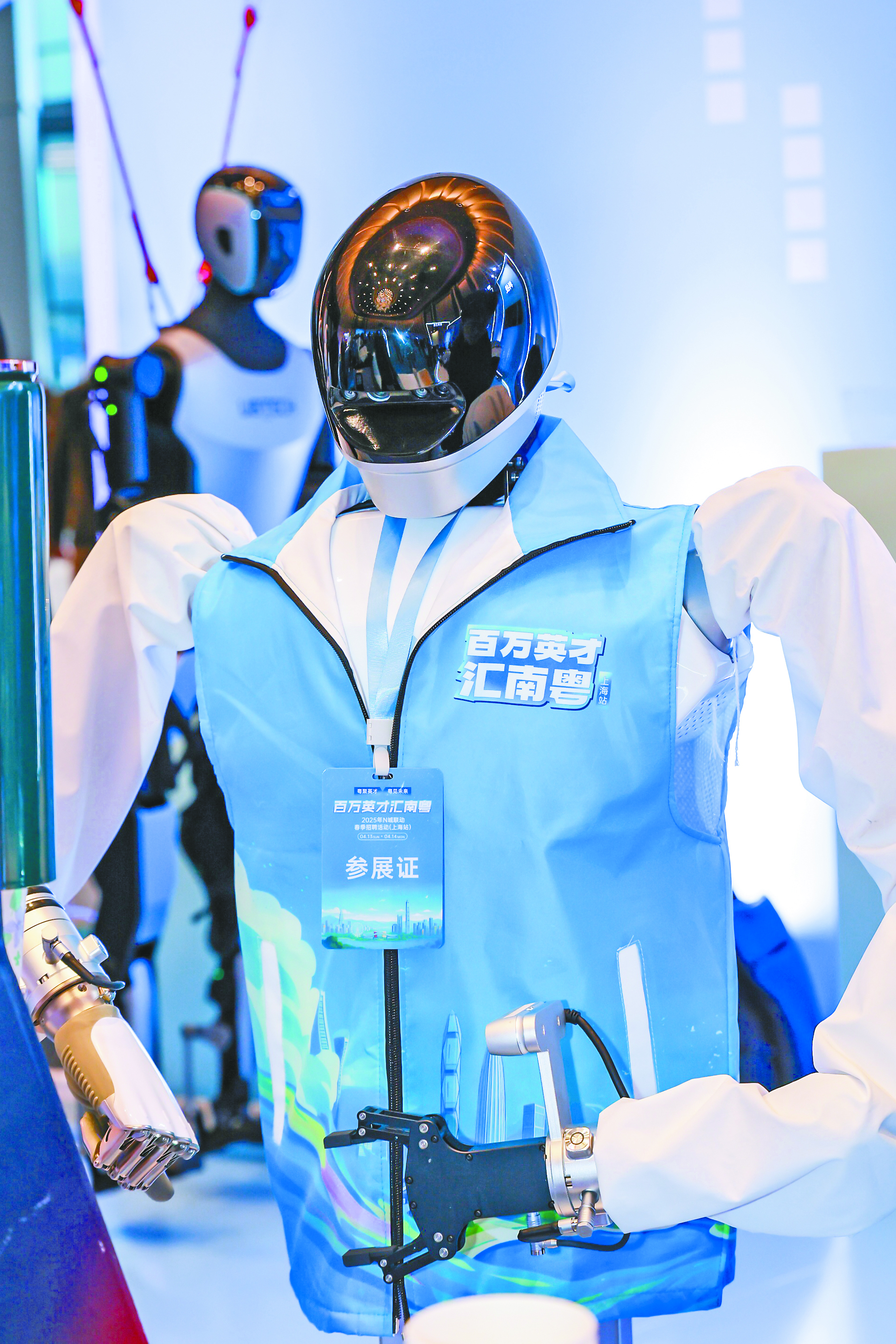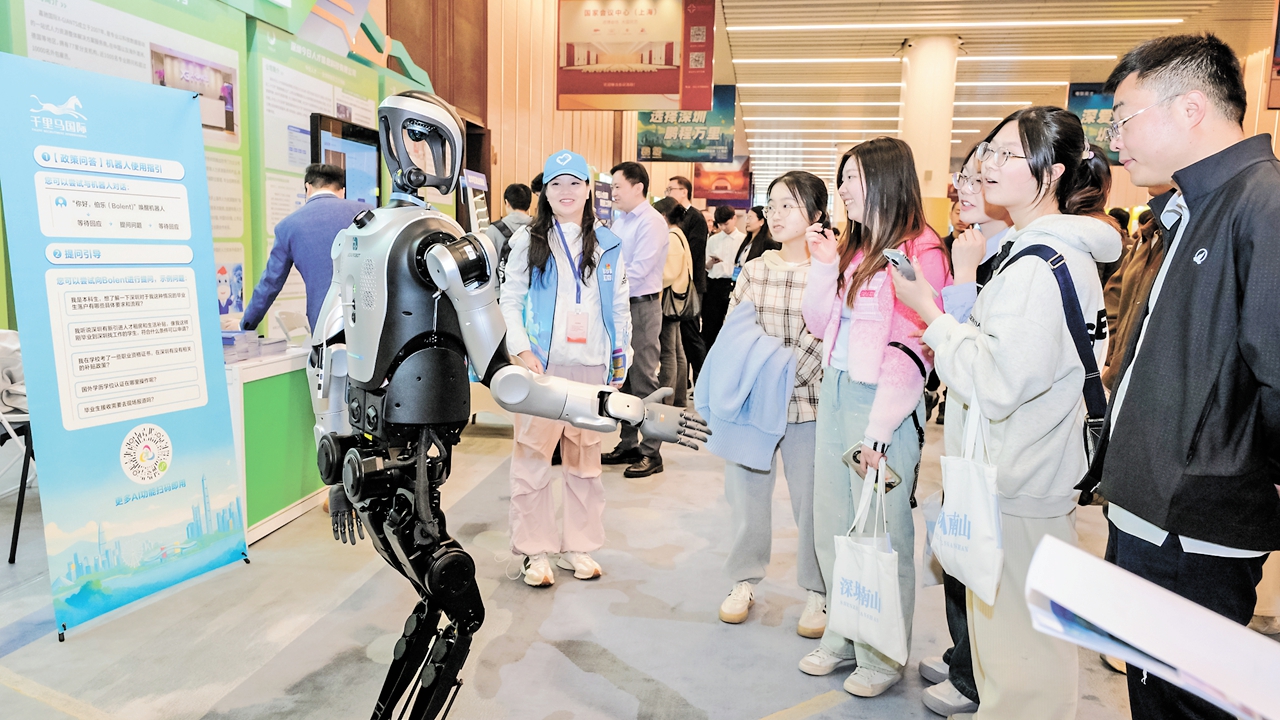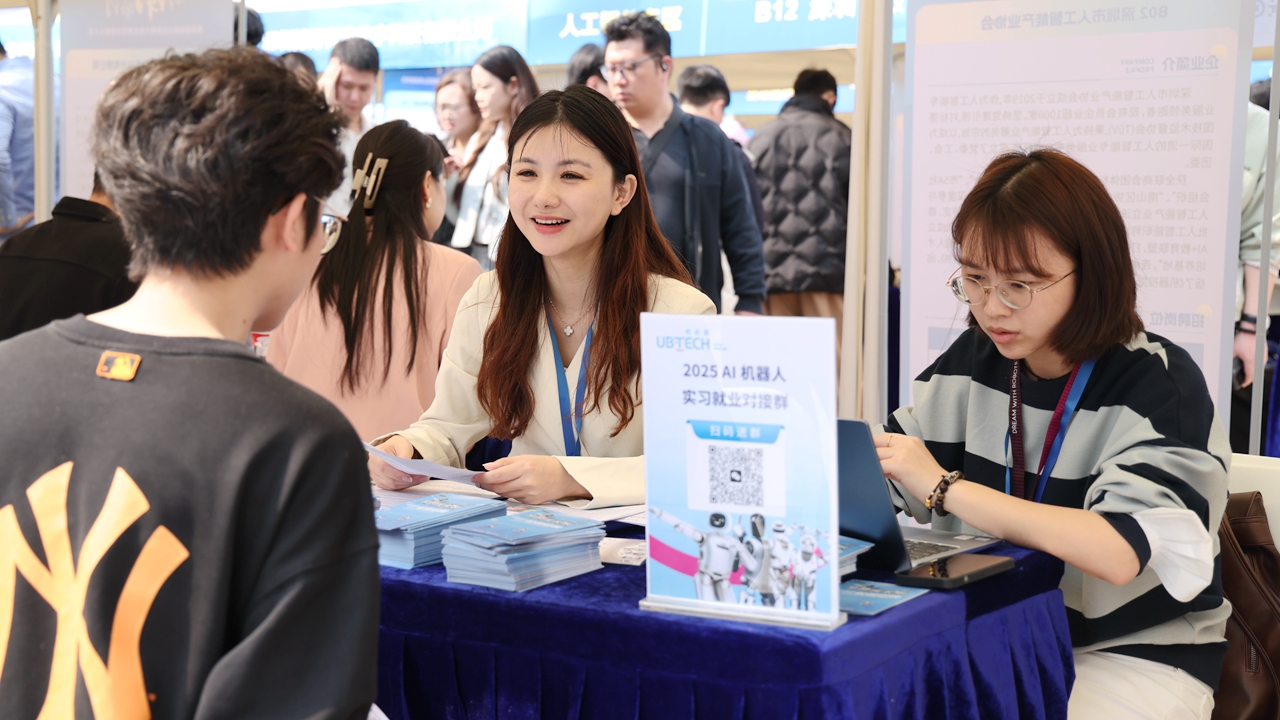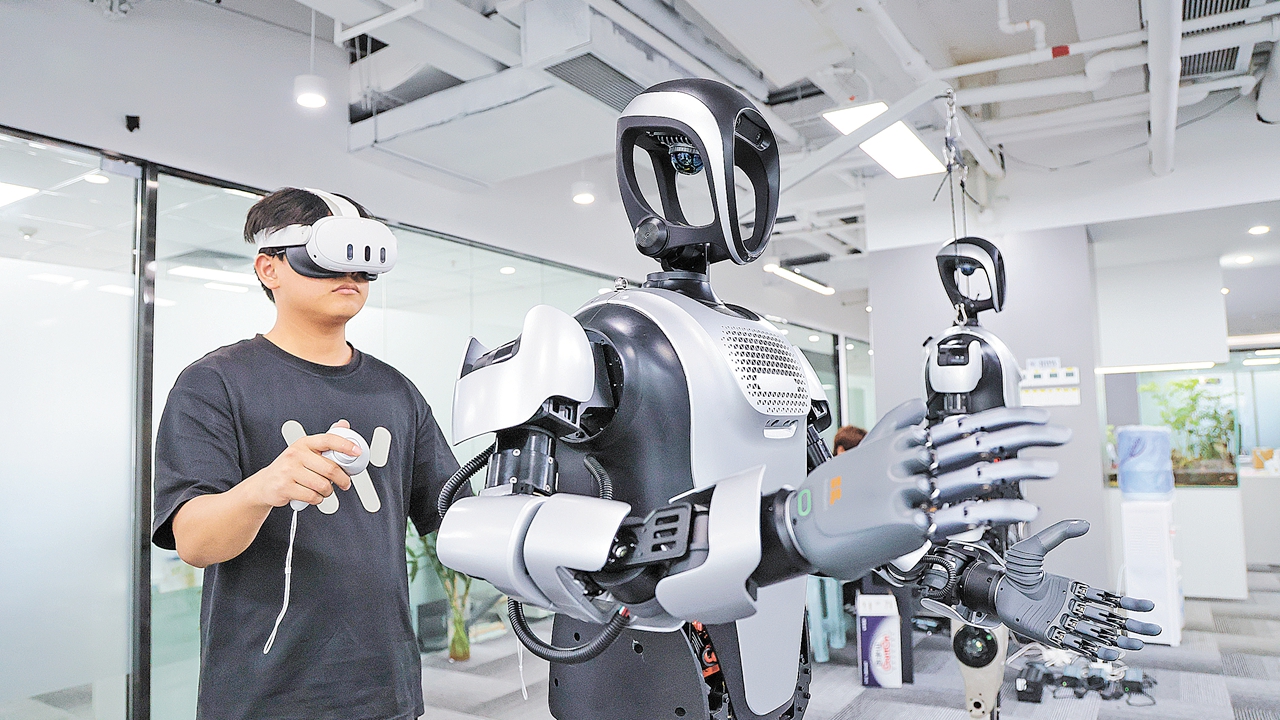Rapid AI growth sparks hiring boom
Writer: | Editor: Lin Qiuying | From: | Updated: 2025-04-16
As China’s job market grows increasingly competitive, college graduates are discovering that mastering artificial intelligence (AI) skills could be their key to success.

A robot recruiter is seen during a job fair for employers from Guangdong Province on Sunday in Shanghai. Courtesy of the event organizers
At a recent job fair in Guangdong Province, a company specializing in brain-computer interface research and development made its ambitions clear, expressing a strong desire to hire algorithm engineers while noting that “there is no cap on hiring!”
“We offer a complimentary two-bedroom apartment and an annual salary of 400,000 yuan (US$55,000) to 700,000 yuan,” said Zheng Hui, founder of the startup NeuroDance. That’s roughly US$55,000 to US$96,000, a highly competitive package for new jobseekers.
AI professionals in short supply
As China prioritizes boosting graduate employment, roles in emerging sectors like AI and robotics remain in critically short supply.
Official data show that a record 12.22 million college graduates are expected to enter the job market in 2025. This year’s government work report has pledged to expand employment and business startup opportunities for students and other young people.
At the recent Guangdong job fair, AI-related positions in electronics, IT, and advanced manufacturing emerged as some of the most in-demand roles.
Tech firms like BYD, Pony.ai, and UBTECH are actively recruiting for positions such as autonomous driving algorithm engineers and AI engine R&D engineers, drawing significant interest from jobseekers.
Liu Silei, who is studying robotics, cognition, and intelligence at the Technical University of Munich, returned to China for the recruitment event. “China’s AI boom is providing ample career opportunities,” Liu said.
 A jobseeker interacts with a quadruped robot during a job fair for employers from Guangdong Province on Sunday at the National Exhibition and Convention Center (Shanghai) in Qingpu District, Shanghai. Courtesy of the event organizers
A jobseeker interacts with a quadruped robot during a job fair for employers from Guangdong Province on Sunday at the National Exhibition and Convention Center (Shanghai) in Qingpu District, Shanghai. Courtesy of the event organizers
A key highlight of a job fair in Shanghai over the past weekend was the concentrated demand from tech firms, particularly for AI professionals. Emerging applications have created new employment opportunities, with companies like BYD and Tencent, as well as robotics firms Han's Robot and Leju Robot, showcasing their products, allowing jobseekers to experience cutting-edge technology firsthand.

Jobseekers interact with a humanoid robot made by Shenzhen's Leju Robot during a job fair in Shanghai on Sunday. Courtesy of the event organizers
“The rise of the new energy vehicle industry has reshaped our talent requirements,” Xu Yunlong, BYD’s recruitment director, said at the event. While traditional mechanical and engineering roles once dominated the automotive sector, the company now prioritizes interdisciplinary experts in AI algorithms, computer science, and big data, Xu said.
Tencent’s campus recruitment manager, Gu Chenning, said that the company launched a nationwide internship drive in February, listing over 7,000 roles, particularly in software development and technical research amid rapid AI advancements. Its latest elite training program exposes participants to frontier projects like large language models, big data, and robotics and provides access to core business teams.
Representing cutting-edge innovation, Shenzhen EngineAI Robotics Technology Co., a 2-year-old startup experiencing rapid growth, reported strong demand for AI talent. “We’ve posted more than 30 R&D roles, including embodied intelligence algorithm engineers, simulation engineers, and mechanical design specialists, with salaries from 400,000 to 1 million yuan,” said HR manager Zhang Shan.
At a similar job fair recently held in Hangzhou, eastern China’s Zhejiang Province, 830 companies offered 21,000 positions, with half of them in AI algorithms and large models.
Local firm Unitree Robotics posted 10 AI-related roles, with monthly salaries reaching up to 70,000 yuan, underscoring the lucrative opportunities emerging in this sector.
“DeepSeek’s explosive growth is driving AI integration across sectors, and the intensifying competition for AI professionals is pushing companies to increase salaries,” said Li Qiang, executive vice president of Zhaopin, an online recruitment platform in China.
Data from the platform show that job postings for algorithm engineers and machine learning roles in February grew by 46.8% and 40.1% year on year, respectively, with average monthly salaries surpassing 20,000 yuan.
The AI talent shortage deepened in the first quarter of 2025, with demand outpacing supply by a ratio of 3:1, according to a report by Liepin, a Chinese jobseeking service provider. Specifically, there are nine job openings for every search algorithm engineer and seven for each recommendation algorithm specialist.

A recruiter looking for AI talent interviews a jobseeker at a job fair in Shenzhen's Nanshan District in February. Xinhua
Demand for AI education and talent development is also surging. Job openings for AI trainers after this year’s Chinese New Year soared by 112%, with positions offering a monthly salary of over 15,000 yuan, according to Zhaopin.
“The most urgent needs are fundamental scientists and cross-disciplinary experts,” said Wang Liang, a researcher from the Institute of Automation under the Chinese Academy of Sciences. “They are crucial for advancing home-grown AI chip development and original algorithms while also accelerating AI’s adoption across industries.”
Demand soars amid AI race
The DeepSeek phenomenon has sparked an AI race among China’s tech giants, including Alibaba and Tencent. At the same time, their models are being rapidly adopted across government services, manufacturing, health care, consumer goods, and urban management, creating an unprecedented demand for professionals who can blend AI expertise with industry-specific knowledge.
AI only became an official undergraduate major in China in 2019. Currently, most AI professionals transition from backgrounds in computer science, software engineering, electronics, or mechanical engineering. These fields require a strong foundation in advanced linear algebra, probability theory, statistics, and programing skills.
China’s higher education system has introduced AI programs at over 500 universities, marking one of the fastest disciplinary expansions in its history.
Leading Chinese universities such as Tsinghua University, Wuhan University, and Shanghai Jiao Tong University have announced plans to expand enrollment in AI and related interdisciplinary fields to meet the growing demand for talent. Shanghai Medical College of Fudan University currently offers over 20 AI-related courses that cover both essential computer theories and practical applications.
Such courses are well-received. A course on large language models and generative AI at Tsinghua University has become so popular this semester that the classroom hosting this course was packed beyond capacity, with doorways, aisles, steps, and even the space immediately outside filled with eager learners, some of whom stood for the entire two-hour session just to be part of it.
“The integration of AI into university general education signifies that it has evolved into a universal technology for learning, researching, and working,” said Wu Fei, director of the Institute of Artificial Intelligence of Zhejiang University in eastern China. “Mastering the use of AI is now a skill that everyone should acquire.”
Industry reports indicate that by 2030, China is expected to face a shortage of 4 million AI professionals.
“Higher education in any country is a valuable resource for national strategy,” Wu said, adding that there will be more effort to incorporate key fields, such as AI and biotechnology, to better align with national strategies and technological development.
AI entrepreneurs are urging working professionals to upskill in AI. “AI competency must become a core citizen skill,” said Liu Qingfeng, chairman of iFLYTEK. “Free AI training initiatives targeting low-income and disadvantaged groups should also be considered.”

An engineer tests a robot at Shenzhen's Leju Robot. Xinhua
“Young professionals should dedicate weekly time to track global AI advancements across industries,” said Wang Xingxing, founder of Unitree Robotics. “This will be the opportunity multiplier.”(Xinhua)